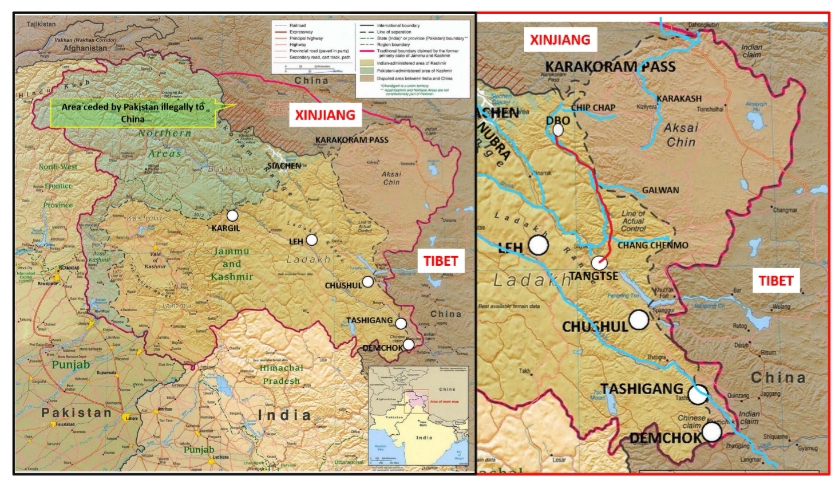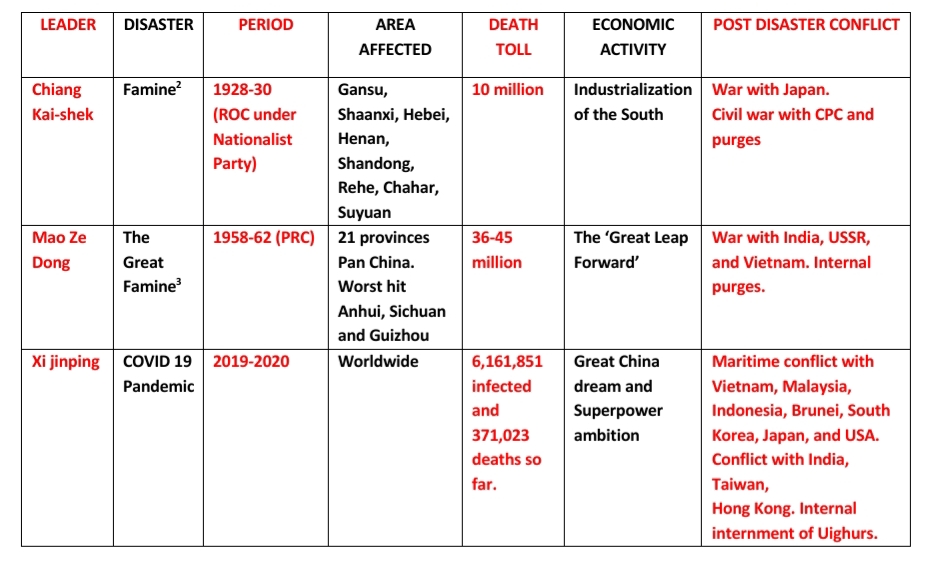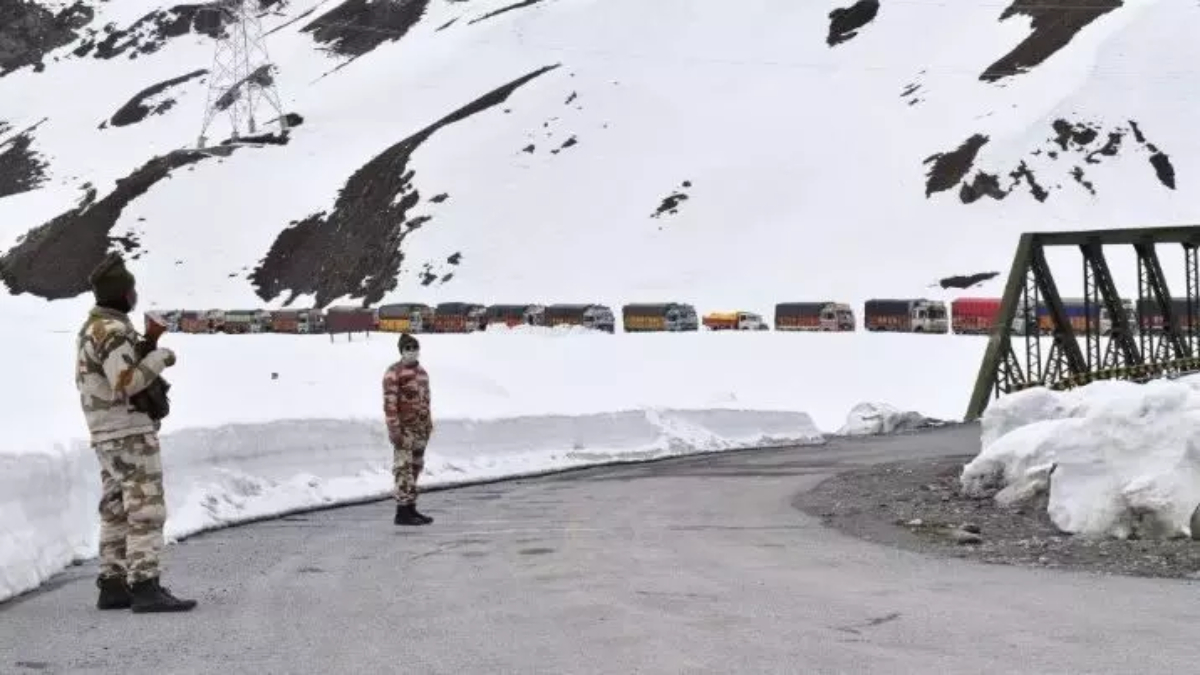In 1962, Chou En-lai made that famous remark, “Hindi Chini Bhai Bhai”, and promptly invaded India. After Wuhan and Mahabalipuram Summits, Xi Jinping’s China has transgressed the LAC to mark the 70th anniversary of Sino-Indian ties. A customary stab in the back? Untrustworthy as ever. However, China has dealt its hand. It is our turn now. We need to be astute; play tough and smart.
The ongoing standoffs with China are unique. Non-tactical with tents and vehicles lined up. Incursive flag marches to deliberately exhibit force! Low threshold of violence. High stakes political messaging. Our analysis and response must also be political. However, most discussion is through the military prism. The two most important questions are — why have they done this? And what should we do? This is a detailed operation planned well in advance. We need to retrace events to answer these questions.
In April, as China recovered from Covid, others were getting stricken. Sensing an opportunity, it undertook aggressive action in South China Sea — its front door. It paid off. By then nationalism has spiked, mask diplomacy was strident, and the economy was witnessing revival green shoots. Emboldened, it considered invading Taiwan. The time window too small. Meanwhile India was exercising regional leadership and joining the “decoupling from China” drive. Indications of imposing National Security Law in Hong Kong started emanating from China. By end Apr there was a multi front international backlash against China. China assessed that the situation could go bad. It was important to single and marginalize India, the rising regional competitor. The rear door needed locking. Hence it launched multi-pronged incursions against India in Sikkim and Ladakh. It was timed to coincide with the worsening pandemic situation in India. The Valley was heated by Pakistan and Lipu-lekh Pass issue was raked up by Nepal in concert. Flowing from this, the decipherable Chinese intent is as under:
Use Indian psychological sensitivity towards the LAC and China to impose a pullback to make it focus inwards. Time it with the worsening pandemic situation in India.
Impose military caution on India, by threatening or securing identified vital area(s) . Close out retaliatory options. Effect a permanent alteration of the LAC to own advantage.
Improve own defensive options and promote offensive options for a later stage.
Force India to reconsider tilt towards USA by focused incursion on the LAC. Follow it with protracted engagement through bilateral mechanisms. Negotiate from a position of strength.
Extract trade concessions and break the decoupling drive.
Sew up the rear door in a low-cost option to face the situation on the front door as it unfolds.
Execute a low-key operation without customary media hype. Avoid heightening anti-China nationalism.


Current status
Further action in Sikkim might not unfold due to evolving geopolitical situation. The standoffs in Ladakh are in stasis. The Galwan transgression is clearly in a hitherto-fore undisputed area and the main one. The others at Pangong Tso and Demchok are standard and fall back options. However, the road to DBO is open. Much is being made that the Chinese are objecting to the infrastructure improvement. Specifically the DBO road. However, this road has been under construction for 18 years. What is new?
As per ‘China’s National Defense in the New Era’ (White Paper of July 2019): ‘External separatist forces for “Tibet independence” and the creation of “East Turkistan” launch frequent actions, to pose threats to China’s national security and social stability’…… China’s national defense aims to deter and resist aggression, safeguard national political security and oppose and contain “Taiwan independence” in that priority. The next priority is “to crack down on proponents of separatist movements such as “Tibet independence” and the creation of “East Turkistan”. South China Sea, etc, are later!
The road from Darbuk to DBO leads to Karakoram Pass. It enables clear access to Xinjiang/East Turkistan. Eastern Ladakhis have ethnic similarity with Tibetans. They are commonly referred to as Changtangi’s. Eastern Ladakh with its improving infrastructure and ability to fuel both threats is critical. The illegally ceded Shaksgam Valley and CPEC are near Karakoram Pass. India has abrogated Article 370 and has started including Gilgit Baltistan as part of its territory. Good cause for Chinese worry. It is not the military angle. But the political one. The question is – why has China waited for 18 years? The geopolitical situation has changed! Xinjiang and Tibet are annexed territories with separatist movements. Support these movements and the dragon’s tail is on fire. Earlier no one considered this option seriously with China in ascendancy. The new geopolitical situation makes this option attractive. See this in the overall context of Tibet, Xinjiang, Hong Kong, Taiwan, and South China Sea. Chinese strategic opportunism through incremental action aims to iron out its wrinkles.
Historic schism
Take a detour. Examine this greatly touted Chinese Civilisation. In the past century, China was dominated by four leaders — Chiang Kai-shek, Mao Zedong, Deng Xiaoping and Xi Jinping. Apart from Deng the other three have presided over China’s worst disasters, endeavoured to unrealistically superfast track its progress and have led the country into a period of isolation, unrest and/or conflict. So much for the Middle Kingdom! Their track record is pathetic.
Mao’s Great Leap Forward and Cultural Revolution intended to achieve economic greatness in a fraction of time that it took other nations decades to accomplish. He created the largest manmade famine in history. Analysis indicates that the Great Famine had three attributes common to manmade disasters – omission, commission, and selective provision. Mao’s greatest omission was not to even acknowledge the famine or initiate remedial action (including seeking aid) for nearly three years. Mention of ‘Great Famine’ is taboo in China even till date. It is called a period of Natural Disasters. The worst acts of commission were abolishing private food production, establishing mismanaged communes, and exporting food during the famine when people were starving. They were driven to cannibalism. Yes Cannibalism[1]! Did you know that? Ruling elite and cities were selectively provided with food. The death toll? 45 million dead — equivalent to present day population of Argentina, Algeria, or Sudan. After that China was in international isolation till 1972. Despite the Great Leap failing, China went to war with India, Russia, and Vietnam in the ensuing period. It remained unstable internally with numerous purges. The Chiang Kai-shek period was only a shade paler since most action was internal to China.
Xi Jinping has bettered Mao. Deliberate omission to regulate wet markets after the 2002-03 SARs outbreak, despite knowing that these were sources of outbreaks. Once Covid-19 outbreak was discovered in Nov 19, China deliberately omitted to acknowledge human to human transmission till too late. Acts of commission? Plenty. Cover up, public feasts in Wuhan, false reporting, pressurizing WHO, under reporting cases, threats, coercion and much more. Allowing unchecked international travel despite banning internal travel is a clear case of criminal selectivity. The already cooling economy is now in a slippery slope. BRI in trouble. Economic and political isolation looming ahead. Job losses/trimming estimated at 600-800 million. Add 56 million in rural poverty and 150 million malnourished people. We often forget that China is still not fully developed. Social unrest is in the air. The ‘China Dream’ on accelerated timelines is derailed. However, Xi’s craving for strategic dominance and superpower status has not diminished. Xi Jinping and his defense minister talk of war preparation. China has antagonized a wide range of nations – USA, UK, EU, Australia, India, Japan, Vietnam, Malaysia, Philippines, Taiwan, S Korea, and more. Its cup is overflowing.
Assessment
The Mao and Xi periods are eerily similar. The pandemic situation will keep China on tenterhooks. As China enters a period of post pandemic instability, the CCP will continue to externalize the situation and keep nationalism high for survival. Change of guard is not ruled out. China will remain an aggressive and untrustworthy neighbour. We should not ignore its historic schism. Talk of peaceful progress and mutual co-existence is mere bunk. China’s front door will remain volatile. Not a day passes when one does not hear of an incident in Hong Kong, Taiwan or South China Sea. USAs proposal to restructure G7 group of nations without China is significant. China will fudge its economy and statistics to show high growth to its people to hype nationalism. However, its internal problems might just multiply. These incursions have been launched in a period of hope with great expectation. That has changed. China has overplayed its hand. China will not go back unless leveraged.
As we contemplate action, we need to take stock of our own status. The pandemic situation is stable despite daily spike in cases. The recovery rates are high, death rates are low and hospital capacities are not overwhelmed. The economy has taken a huge hit. However, it is still in overall positive zone and is one of the major economies which will stay that way. Our military in intact. Our global image and relevance are rising. I am and will remain an optimist. India is rising. Make no mistake.
Unstable China
The Chinese ploy of dividing alliances and singling out nations is working. I see articles advocating peace with China. We must live with our neighbours, let us not get caught in a war between powers kind. Pakistan and China are our neighbours who are colluding to destroy us. The detour into some grisly history was to prove that China will remain an unstable troublesome adversary.
There are a whole range of options available to India. Long to short terms in a wide span- military, political, economic, cultural, religious, and scientific. The leverages are manifold. We need to have a well thought out, comprehensive and graded response. No point being emotional, reactionary, or jumpy about it. China will react. So be it. One thing for sure, the faster we de couple from China the better. Even if we take a decade to do so – we start yesterday. The best option? Attain self-sufficiency. Our biggest weapon is our people. It needs political will and sagacity to exercise these options. China perceives and expects vitriol from people but relies on government and greedy Indians to toe its line. Reverse that.
To give a glimpse of specific options. Militarily we can evict intruders, cut them off or do a counter intrusion. We can resort to an economic boycott, weaponize trade or people’s sentiment. We could export religion and sow seeds of independence in Tibet and Xinjiang. We could get into alliances, like the Quad, or form new ones to counter China. We can deal with them bilaterally or multilaterally. One can write a thesis on options.
As Indians we need to understand that while China has started a game of GO, we must say NO GO and start kabaddi which we are good at. Play to our strengths and their weaknesses. Prepare for the long haul.
Lt Gen P.R. Shankar was India’s DG Artillery. He is highly decorated and qualified with vast operational experience. He contributed significantly to the modernisation and indigenisation of artillery. He is now a Professor in the Aerospace Dept of IIT Madras and is involved in applied research for defence technology.

